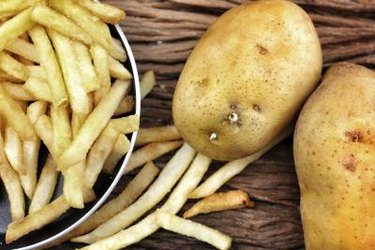
No food generates body fat in any specific location, but some people put on weight in the thighs and buttocks more easily than others. If you put on weight in lower areas first, you have a health advantage over those who store fat around the waist. Eating too many potatoes could cause you to gain fat, but the condiments often contribute the higher numbers on your calorie counter app.
Gender
Video of the Day
Your gender strongly influences where your body places its fat. Pre-menopausal women usually accumulate fat in the buttocks, hips and thighs. Men place fat in the abdomen first. Deposits of visceral fat inside the abdominal cavity increase the risk of diabetes and cardiovascular illness. Fat deposits in the lower body don't carry the same risk of obesity-related disease. In women past menopause, the balance shifts as fat stores move upward. When fat moves to the abdomen, the incidence of disease rises. Hormones generated by women's ovaries could control the location of primary fat stores, according to Dr. Deborah Clegg of UT Southwestern Medical Center.
Video of the Day
Heredity
Heredity also influences the distribution of your body fat. If you come from a family in which the pear shape dominates, you're more likely to develop that shape yourself, especially if you're female. Out of 14 gene regions linked to fat distribution, half affect women more strongly than men, according to an article in the October 2010 "Harvard Gazette." Your genetic background could make controlling weight gain simple or a constant struggle. Genetic patterns shift metabolism, affect insulin production and control appetite. Genetic differences could help explain why fat in some locations causes more health problems.
Potatoes
Even if you're prone to put on weight in the buttocks, potatoes might not be the main source of the calories. One 5 ounce potato contributes just 100 calories to your daily diet. If you eat the entire potato with the peel, you'll get 35 percent of your daily requirement of vitamin C. The potato also provides 10 percent of the iron you need each day and 6 percent of your daily protein. The carbohydrates in potatoes include both simple starches for quick energy and complex carbohydrates for long-lasting power. Potatoes by themselves add important nutrition to a meal.
High-Calorie Options
Adding rich toppings to a baked potato converts a healthy choice into a fattening problem. Two tablespoons of real butter adds about 200 calories, and 1/4 cup of shredded cheddar cheese adds 114 calories. Topping it off with 2 tablespoons of bacon bits, at 48 calories, increases the total calorie count to 462. You could shift from the usual white baking potato to a yellow variety with more flavorful waxy flesh, and use fewer toppings to cut calories. If you still overindulge, and you fit the pear-shaped body pattern, the potatoes could add to the fat on your buttocks.
- UT Southwestern Medical Center; "Belly Fat or Hip Fat..."; Kristen Holland Shear; May 2010
- "Harvard Gazette"; "Progress on Obesity"; Sue McGreevey; October 2010
- North Dakota State University; "Potatoes -- From Garden to Table"; Julie Garden-Robinson et al.; February 2006
- U.S. Potato Board; "Talking About Potato Nutrition"; November 2006